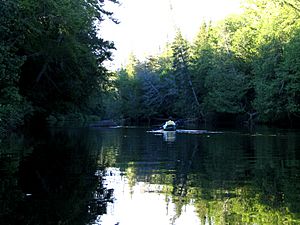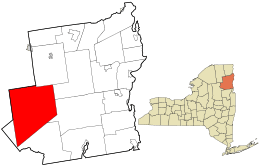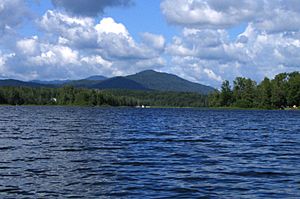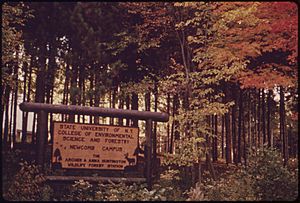Newcomb, New York facts for kids
Quick facts for kids
Newcomb, New York
|
|
|---|---|

The Hudson River in Newcomb, a few miles south of its source
|
|
| Motto(s):
"Heart of the Park"
|
|

Location in Essex County and the state of New York
|
|
| Country | United States |
| State | New York |
| County | Essex |
| Government | |
| • Type | Town Council |
| Area | |
| • Total | 233.17 sq mi (603.90 km2) |
| • Land | 226.19 sq mi (585.83 km2) |
| • Water | 6.98 sq mi (18.07 km2) |
| Elevation | 1,946 ft (593 m) |
| Population
(2010)
|
|
| • Total | 436 |
| • Estimate
(2016)
|
416 |
| • Density | 1.84/sq mi (0.71/km2) |
| Time zone | UTC−5 (Eastern (EST)) |
| • Summer (DST) | UTC−4 (EDT) |
| ZIP codes |
12852, 12879
|
| Area code(s) | 518 |
| FIPS code | 36-031-50144 |
| GNIS feature ID | 0979261 |
Newcomb is a small town in Essex County, New York, United States. In 2010, about 436 people lived there.
The town is located on the western side of Essex County. It's about 86 miles southwest of Plattsburgh. Newcomb is inside the huge Adirondack Park. It's also home to the Lake Harris Campground, a popular spot for camping. Newcomb is the largest town in Essex County by land area.
Contents
History of Newcomb
Newcomb is in an area that was once important to both Iroquois and Algonquian Native American tribes. It was also a border area between the early colonies of New York and New France.
People started settling in Newcomb around 1816. At first, the main business was cutting down trees for lumber. But then, large amounts of iron ore were found, which changed the town's economy.
The town of Newcomb was officially created in 1828. It was formed from parts of the towns of Minerva and Moriah. Newcomb includes a small community called the hamlet of Newcomb, but it doesn't have any incorporated villages.
By the late 1800s, Newcomb became known as a great place for outdoor activities like hunting and fishing.
A famous event happened in Newcomb in September 1901. Theodore Roosevelt, who was Vice President at the time, was hunting and hiking in the town when he learned that President William McKinley was dying.
Two important historical sites in Newcomb are Camp Santanoni and the Mount Adams Fire Observation Station. Both are listed on the National Register of Historic Places, which means they are important to the history of the United States.
Geography of Newcomb
Newcomb covers a total area of about 603.9 square kilometers (233.17 square miles). Most of this area is land, but about 17.9 square kilometers (6.98 square miles) is water. The famous Hudson River actually begins in Newcomb at Henderson Lake. It then flows south through the middle of the town.
The western edge of Newcomb borders Hamilton County. The northern part of the town's boundary touches Franklin County.
New York State Route 28N is a main road that runs east to west through Newcomb.
Newcomb's Climate
Newcomb has a humid continental climate (called "Dfb" by scientists). This means it has warm summers with cool nights. The winters are cold and snowy. On average, Newcomb gets about 104.9 inches of snow each year.
| Climate data for Newcomb, New York, 1991–2020 normals, extremes 1940–present | |||||||||||||
|---|---|---|---|---|---|---|---|---|---|---|---|---|---|
| Month | Jan | Feb | Mar | Apr | May | Jun | Jul | Aug | Sep | Oct | Nov | Dec | Year |
| Record high °F (°C) | 60 (16) |
62 (17) |
78 (26) |
88 (31) |
91 (33) |
95 (35) |
94 (34) |
94 (34) |
91 (33) |
85 (29) |
74 (23) |
62 (17) |
95 (35) |
| Mean maximum °F (°C) | 45.9 (7.7) |
47.7 (8.7) |
57.4 (14.1) |
73.0 (22.8) |
82.9 (28.3) |
86.1 (30.1) |
86.3 (30.2) |
84.5 (29.2) |
82.0 (27.8) |
74.1 (23.4) |
61.6 (16.4) |
48.2 (9.0) |
88.5 (31.4) |
| Mean daily maximum °F (°C) | 25.6 (−3.6) |
28.8 (−1.8) |
37.3 (2.9) |
50.2 (10.1) |
64.3 (17.9) |
72.4 (22.4) |
76.6 (24.8) |
74.5 (23.6) |
67.4 (19.7) |
54.4 (12.4) |
41.4 (5.2) |
30.6 (−0.8) |
52.0 (11.1) |
| Daily mean °F (°C) | 14.7 (−9.6) |
16.5 (−8.6) |
25.3 (−3.7) |
38.6 (3.7) |
51.8 (11.0) |
60.5 (15.8) |
64.8 (18.2) |
63.0 (17.2) |
55.9 (13.3) |
44.1 (6.7) |
32.6 (0.3) |
21.5 (−5.8) |
40.8 (4.9) |
| Mean daily minimum °F (°C) | 3.7 (−15.7) |
4.2 (−15.4) |
13.2 (−10.4) |
26.9 (−2.8) |
39.2 (4.0) |
48.7 (9.3) |
53.0 (11.7) |
51.6 (10.9) |
44.3 (6.8) |
33.7 (0.9) |
23.8 (−4.6) |
12.3 (−10.9) |
29.6 (−1.3) |
| Mean minimum °F (°C) | −19.6 (−28.7) |
−16.8 (−27.1) |
−10.9 (−23.8) |
13.2 (−10.4) |
27.2 (−2.7) |
35.9 (2.2) |
43.7 (6.5) |
41.2 (5.1) |
31.4 (−0.3) |
22.3 (−5.4) |
6.6 (−14.1) |
−10.2 (−23.4) |
−23.5 (−30.8) |
| Record low °F (°C) | −36 (−38) |
−40 (−40) |
−31 (−35) |
−3 (−19) |
18 (−8) |
25 (−4) |
31 (−1) |
29 (−2) |
22 (−6) |
10 (−12) |
−19 (−28) |
−31 (−35) |
−40 (−40) |
| Average precipitation inches (mm) | 3.33 (85) |
2.73 (69) |
3.09 (78) |
3.55 (90) |
4.24 (108) |
4.35 (110) |
4.20 (107) |
4.23 (107) |
3.70 (94) |
4.50 (114) |
3.74 (95) |
3.83 (97) |
45.49 (1,154) |
| Average snowfall inches (cm) | 23.9 (61) |
23.4 (59) |
19.6 (50) |
4.6 (12) |
0.2 (0.51) |
0.0 (0.0) |
0.0 (0.0) |
0.0 (0.0) |
0.0 (0.0) |
0.8 (2.0) |
8.6 (22) |
23.8 (60) |
104.9 (266.51) |
| Average extreme snow depth inches (cm) | 17.9 (45) |
23.3 (59) |
23.4 (59) |
11.5 (29) |
02. (5.1) |
0.0 (0.0) |
0.0 (0.0) |
0.0 (0.0) |
0.0 (0.0) |
0.6 (1.5) |
4.7 (12) |
12.0 (30) |
26.5 (67) |
| Average precipitation days (≥ 0.01 in) | 17.2 | 13.1 | 12.4 | 12.7 | 13.4 | 13.0 | 12.8 | 11.8 | 11.2 | 13.7 | 13.7 | 16.3 | 161.3 |
| Average snowy days (≥ 0.1 in) | 15.1 | 11.4 | 8.6 | 3.5 | 0.2 | 0.0 | 0.0 | 0.0 | 0.0 | 0.8 | 5.5 | 13.0 | 58.1 |
| Source 1: NOAA | |||||||||||||
| Source 2: National Weather Service | |||||||||||||
Newcomb's Population
| Historical population | |||
|---|---|---|---|
| Census | Pop. | %± | |
| 1830 | 62 | — | |
| 1840 | 74 | 19.4% | |
| 1850 | 277 | 274.3% | |
| 1860 | 157 | −43.3% | |
| 1870 | 178 | 13.4% | |
| 1880 | 237 | 33.1% | |
| 1890 | 283 | 19.4% | |
| 1900 | 507 | 79.2% | |
| 1910 | 509 | 0.4% | |
| 1920 | 313 | −38.5% | |
| 1930 | 437 | 39.6% | |
| 1940 | 460 | 5.3% | |
| 1950 | 1,212 | 163.5% | |
| 1960 | 1,187 | −2.1% | |
| 1970 | 957 | −19.4% | |
| 1980 | 681 | −28.8% | |
| 1990 | 544 | −20.1% | |
| 2000 | 481 | −11.6% | |
| 2010 | 436 | −9.4% | |
| 2016 (est.) | 416 | −4.6% | |
| U.S. Decennial Census | |||
In 2000, there were 481 people living in Newcomb. These people lived in 211 households, and 140 of these were families. The population density was about 2.1 people per square mile.
Most people in Newcomb were White (95.22%). A small number were Native American or from other backgrounds. About 19.9% of households had children under 18 living with them. The average household had 2.26 people.
The median age in Newcomb was 51 years old. This means half the people were older than 51 and half were younger. About 19.5% of the population was under 18 years old.
Places to See in Newcomb
- Adirondack Interpretive Center (AIC) – This is a visitor center where you can learn about the environment and the Adirondack Park. It helps visitors understand the area.
- Camp Santanoni – This is one of the "Great Camps" built in the 1800s. It's being restored and is located on Newcomb Lake.
- Catlin Lake – A lake partly located on the western border of the town.
- Goodnow Flow – This is a lake made by people, found southwest of the main Newcomb community.
- Lake Harris – A lake located northeast of the Newcomb community.
- Henderson Lake – This lake is north of Tahawus. It's special because it's where the Hudson River officially begins!
- Hudson River Gorge – A deep valley carved by the Hudson River, located south of the Newcomb community.
- Moose Pond – A lake found near the western edge of the town.
- Newcomb – This is the main community, or hamlet, of Newcomb. It's located right on NY-28N.
- Newcomb Lake – A lake in the western part of the town.
- Perch Pond – A lake located east of the Tahawus Club.
- Rich Lake – A lake found northwest of the Newcomb community.
- Sanford Lake – This lake is on the Hudson River near Tahawus, a few miles south of Henderson Lake.
- Tahawus – A place in the northern part of the town on County Road 25. It used to be a big mining town for iron in the 1800s, but now it's mostly a ghost town (meaning it's mostly deserted). Tahawus is also an old Native American name for Mount Marcy, which is the highest mountain in New York.
- Tahawus Club – A location east of Newcomb.
- Trout Pond – A lake located east of the Tahawus Club.
- Wolf Pond – A lake found near the western border of the town.
Images for kids
-
The Hudson River in Newcomb, a few miles south of its source
-
Location in Essex County and the state of New York
See also
 In Spanish: Newcomb (Nueva York) para niños
In Spanish: Newcomb (Nueva York) para niños





